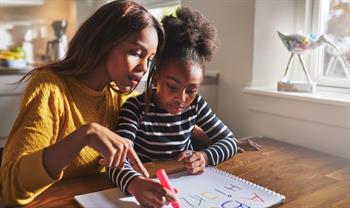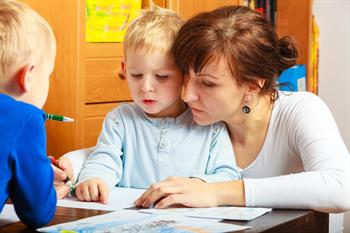Resources for Parents
VIDEOS: Executive Function Basics for Parents
If you have a child with executive function challenges such as getting stuck or overwhelmed, or trouble with following directions, then these videos provide simple strategies that parents can use immediately. These short, engaging, videos and animations feature real-life situations, practical advice from experts, parents sharing their wisdom, and easy to understand explanations. (Click on each image to be taken to that video).
Children react, in part, on what they see from the adults around them. When parents and caregivers deal with the COVID-19 calmly and confidently, they can provide the best support for their children. Parents can be more reassuring to others around them, especially children, if they are better prepared.
Helping Children Cope
Children react, in part, on what they see from the adults around them. When parents and caregivers deal with the COVID-19 calmly and confidently, they can provide the best support for their children. Parents can be more reassuring to others around them, especially children, if they are better prepared.
Not all children respond to stress in the same way. Some common changes to watch for in children:

- Excessive crying and irritation
- Returning to behaviors they have outgrown (e.g., toileting accidents or bedwetting)
- Excessive worry or sadness
- Unhealthy eating or sleeping habits
- Irritability and “acting out” behaviors
- Poor school performance or avoiding school
- Difficulty with attention and concentration
- Avoidance of activities enjoyed in the past
- Unexplained headaches or body pain
- Use of alcohol, tobacco, or other drugs
There are many things you can do to support your child:

- Take time to talk with your child about the COVID-19 outbreak. Answer questions and share facts about COVID-19 in a way that your child can understand.
- Reassure your child that they are safe. Let them know if is ok if they feel upset. Share with them how you deal with your own stress so that they can learn how to cope from you.
- Limit your child’s exposure to media coverage of the event. Children may misinterpret what they hear and can be frightened about something they do not understand.
- Help your child to have a sense of structure. Once it is safe to return to school or child care, help them return to their regular activity.
- Be a role model; take breaks, get plenty of sleep, exercise, and eat well. Connect with your friends and family members and rely on your social support system
For Parents
- Child Mind Institute: Facebook live discussions with child psychologist
- CU: Learn and Grow Collaborative
- Connecting the SEL(social emotional learning) Community: COVID Resources
- Coronavirus: Keeping Our Children And Ourselves Safe, With Pamela Cantor, M.D.
- CNN: Shows kids can watch while they're out of school that you won't feel bad about
- NPR: Just For Kids- A Comic Exploring The New Coronavirus
- 150+ Educational Shows on Netflix
- CHCO COVID Support Page
- Parent Viewing Guide for the Pixar Movie Inside Out
- Crisis Planning for Parents with Shared Custody
Working From Home
Talking to Your Child
- Together by St.Jude: How to Talk to Your Child About Coronavirus and COVID-19
- PBS News Hour: How to talk to children about the coronavirus pandemic
- The New York Times: Talking to Teens and Tweens About Coronavirus
Stories to Help Explain COVID
- School closure social story
- Going to the Doctor Social Story
- Piplo Productions: Fighting the Big Virus Trinka, Sam, and Littletown Work Together
Supporting Your Child
- PREMERA: Help Kids Navigate COVID
- QUARTZ: How to give your kids stability when coronavirus closes schools
- Child Mind Institute: Daily tips to support children during COVID-19
- Child Mind Institute: Supporting teens through COVID-19 Coronavirus Outbreak: Children's Hospital Colorado Shares Tips for Calming Kids' Anxiety
- Health Care Toolbox: COVID-19, Helping my Child Cope (General)
- Children’s mental health resources for families
- NASP: Helping Children Cope with Change Resulting from COVID-19
- Bedtime Stress & COVID: 19 Wellness Tools For Kids
Mindfulness for Kids
Learning From Home
Relief for families transitioning to schooling at home. Advice from educators, health and safety specialists, homeschoolers
- Hotline number: 1-855-264-2051
- American Institutes for Research: Building Positive Conditions for Learning at Home: Strategies and Resources for Families and Caregivers
Full-Day Comprehensive Curriculum for Homeschooling Websites
- Daily schedules for students (Khan Academy). Ages 4-18
- Khan Academy – Math, science & engineering, art & humanities, test prep, College info, ELA beta, computing, economics, and finance. Ages 2-7
- Denver Public Schools – Guides per grade
- A comprehensive list of all free educational resources
- SHAPE America: A comprehensive list of physical activity resources, journaling, and more
Supplementary Homeschooling Materials
- Scholastic Learn at Home – in-depth projects, For all ages
- Common Sense Media: List of documentaries for children and families
- 30+ Virtual Field Trips for Kids
- Virtual Farm Tours While You're Stuck at Home
- Google: Virtual Museum Tours
- 101 Virtual Tours of Popular Tourist Attractions Around the World
- KQED At-Home Learning Resources
- New America: Tips and Resources for PreK-12 with Equity in Mind
- Common Sense: Resources for Educators During the Coronavirus Pandemic
- Leaning Keeps Going: Parent ideas and tips for online learning
- But Why: The podcast for curious kids
- Crash Course
- Crash Course Kids
- The Brain Scoop
Activities for Children
Here are some options to keep kids busy with limited screen interventions:
- Zero to Three Great parent-child activity list
- Tinkergarten
- Scavenger Hunts (Indoor and Outdoor)
- Real Play Coalition: Screen-free play ideas (2+)
- Tots Schooling: Free printable
- PBS Kids for Parents: Ways to Play
- Cosmic Kids Yoga
- GoNoodle
- Baking with Kids
- DOPsych: Giant List of Things to Do at Home with Kids
- Virtual 3D The Museum of Natural History at the Toledo Zoo
- Cincinnati Zoo Home Safari
- Virtual Road Trips!
- Tai Chi for Kids - Thank you to Hailey from Lyndhurst Troop 44 for this suggestion!
Websites for AP High School/College/Adult Learning
- Coursera
- Free 450 Ivy League courses
- Tom Richey: AP History Related videos
- The 10 Best Ways to get Free College Classes
Subject-Specific Options
If you’re looking for more “pick-and-choose” options or ways to supplement homeschool curriculum, here are great options.
Art
Math
- Prodigy Game (6-13)
- Math Game: Hit the Button (6-11)
- Cool Math 4 Kids (5-11)
- Bedtime Math: Math related Printable and Activities (3-9)
Learn a Second Language
Reading/Spelling
Science
- Lesson Plans – K thru grade 5
- Mystery Doug
- National Geographic Kids
- Frontiers for Young Minds — Distinguished scientists write about their discoveries in accessible language for young readers, and then kids—with the help of “science mentors”—provide feedback and help the authors improve the articles before publication.
- Skype a Scientist — Matches a scientist with a family for discussion
- SciShow
- SciShow Kids
- Mike Likes Science: Math and Science Raps
Computing
Social Studies
- History for Kids
- Geography Focus — Maps, country descriptions, flags, and more.
- Mr. Bett’s history rap videos
- AP US History & AP Euro history & other history related videos (middle school and up)
- History Lessons by Stanford: Free just have to create log-in mid school and up.
- Civic/Government Lessons for Kids
Contact Us
Department of Psychiatry
Anschutz Medical Campus
13001 E 17th Place
Fitzsimons Building
2nd floor, Suite C2000
Aurora, CO 80045
Phone: (303)724-4940
Fax: (303)724-4956